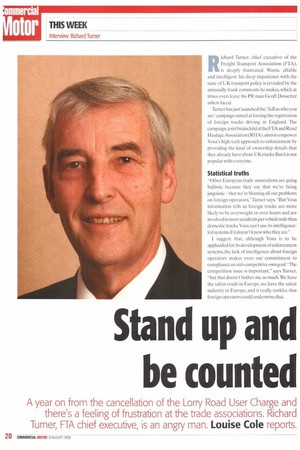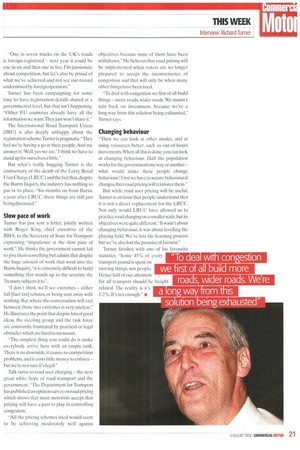Stand up and be counted
Page 20

Page 21

If you've noticed an error in this article please click here to report it so we can fix it.
A year on from the cancellation of the Lorry Road User Charge and
there's a feeling of frustration at the trade associations. Richard Turner, ETA chief executive, is an angry man. Louise Cole reports.
Richard Turner, chief executive of the Freight Transport Association (FTA), is deeply frustrated. Warm, affable and intelligent, his deep impatience with the state of UK transport policy is revealed by the unusually frank comments he makes, which at times even leave his PR man Geoff Dossetter ashen-faced.
Turner has just launched the 'Tell us who you are' campaign aimed at forcing the registration of foreign trucks driving in England. The campaign, joint brainchild of the FTA and Road Haulage Association (RHA).aims to empower Vosa's high-tech approach to enforcement by providing the kind of ownership details that they already have about UK trucks. But it is not popular with everyone.
Statistical truths --Other European trade associations are going ballistic because they say that we're being jingoistic — that we're blaming all our problems on foreign operators," Turner says. "But Vosa information tells us foreign trucks are more likely to be overweight or over hours and are involved in more accidents per vehicle mile than domestic trucks. Vosa can't use its intelligenceled systems if it doesn't know who they are."
I suggest that, although Vosa is to be applauded for its development of enforcement systems, the lack of intelligence about foreign operators makes even our commitment to compliance an anti-competitive own goal."The competition issue is important," says Turner, -but that doesn't bother me as much. We have the safest roads in Europe, we have the safest industry in Europe, and it really rankles that foreign operators could undermine that. One in seven trucks on the UK's roads is foreign-registered next year it could be one in six and then one in five. I'm passionate about competition, but let's also be proud of what we've achieved and not see our record undermined by foreign operators."
Turner has been campaigning for some time to have registration details shared at a governmental level, but that isn't happening. "Other EU countries already have all the information we wan t.They just won't share it."
The International Road Transport Union (MU) is also deeply unhappy about the registration scheme.Turner is pragrnatic."They feel we're having a go at their people. And my answer is: 'Well, yes we are.' I think we have to stand up for ourselves a little."
But what's really bugging Turner is the anniversary of the death of the Lorry Road User Charge (LRUC) and the fact that,despite the Burns Inquiry. th.e industry has nothing to put in its place. "Six months on from Burns, a year after LRUC, these things are still just being discussed."
Slow pace of work Turner has just sent a letter, jointly written with Roger King, chief executive of the RHA, to the Secretary of State for Transport expressing "impatience at the slow pace of work". He thinks the government cannot fail to give them something hut admits that despite the huge amount of work that went into the Burns Inquiry, "it is extremely difficult to build something that stands up to the scrutiny the Treasury subjects it to".
"I don't think we'll see extremes either full [fuel tax I rebates, or being sent away with nothing. But where the conversation will end between those two extremes is very unclear." He illustrates the point that despite lots of good ideas, the steering group and the task force are constantly frustrated by practical or legal obstacles which are hard to surmount.
The simplest thing you could do is make everybody arrive here with an empty tank. There is no downside, it causes no competition problems, and it costs little money to enforce but we're not sure it's legal."
Talk turns to road user charging the next great white hope of road transport and the government. ""che Department for Transport has published an opinion survey on road pricing which shows that most motorists accept that pricing will have a part to play in controlling congestion.
"All the pricing schemes tried would seem to be achieving moderately well against objectives because none of them have been withdrawn." He believes that road pricing will be implemented when voters are no longer prepared to accept the inconvenience of congestion and that will only be when many other things have been tried.
"To deal with congestion we first of all build things more roads, wider roads. We mustn't rein back on investment, because we're a long way from this solution being exhausted,Turner says.
Changing behaviour -Then we can look at other modes, and at using resources better, such as out-of-hours movements. When all this is done, you can look at changing behaviour. I lalf the population works for the government one way or another what would make these people change behaviour? First we have to secure behavioural changes, then road pricing will reinforce them."
But while road user pricing will be useful, Turner is anxious that people understand that it is not a direct replacement for the LRUC. Not only would LRUC have allowed us to practice road charging on a smaller scale, but its objectives were quite different." It wasn't about changing behaviour, it was about levelling the playing field. We've lost the learning process but we've also lost the promise of fairness."
Turner finishes with one of his favourite statistics. Some 45% of every transport pound is spent on moving things, not people. Hence half of our attention for all transport should be freightrelated. The reality is it's 1-2%.It's not enough." •




























































































































































































